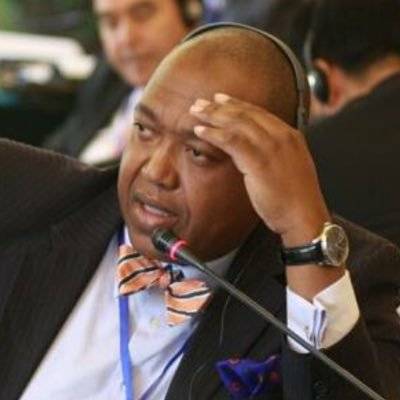US President Donald Trump has extended back-to-back invitations to the leaders of Saudi Arabia, the United Arab Emirates and Qatar before the anticipated US-Gulf summit in Camp David. The summit, which was originally scheduled to take place next month, has been unexpectedly put back to September.
Meanwhile, Qatar’s media has been reporting that Emir Tamim Bin Hamad Al-Thani will be meeting Trump tomorrow, 10 April. Bin Hamad’s visit to the White House follows a visit by the Crown Prince of Saudi Arabia, Mohammad Bin Salman, who has spent almost three weeks crisscrossing the US, the longest overseas visit yet by the young prince.
The visit of Bin Salman was overshadowed by the condescending manner in which Trump dealt with the press conference during his visit. The US President left many journalists and political observers alike flabbergasted when he went on an impromptu rant detailing the investment pledges for military hardware made by Saudi Arabia.
Such visits as that by Bin Salman and Bin Hamad, as well as the Crown Prince of the UAE, Mohammed Bin Zayed, are seen as precursors to the US-Gulf Summit. Bin Zayed was supposed to go to America at the end of March, but the plans were changed at his request, something that has been given various interpretations in the Gulf. The dominating view is that the postponement was in order to flank Bin Hamad’s visit between Bin Zayed and that of Bin Salman to ensure tight control of the summit agenda, whenever it happens.
Read: Qatar Emir to Meet Trump on April 10
In effect, the proposed summit is a replacement for the Gulf Cooperation Council (GCC). Sceptics have accused Bin Salman and Bin Zayed of deliberately destroying the GCC, the top structure of which excludes the two de facto leaders, notwithstanding their executive roles in their own countries. Instead, it is King Salman Bin Saud and Sheikh Khalifa Bin Zayed of Saudi Arabia and the UAE respectively who represent their countries at the top of the GCC. It is they and Bin Hamad who get the heads of state photo opportunity.
![Saudi billionaire Prince Al-Waleed detained in corruption inquiry - Cartoon [Sabaaneh/MiddleEastMonitor]](https://i0.wp.com/www.middleeastmonitor.com/wp-content/uploads/2017/11/cartoon.jpg?resize=500%2C310&ssl=1)
Saudi billionaire Prince Al-Waleed detained in corruption inquiry – Cartoon [Sabaaneh/MiddleEastMonitor]
The solution to the Gulf crisis lies squarely with Saudi Arabia, but the US will not force its hand in this regard for obvious reasons. For a start, the business contracts which the US and Saudi Arabia have entered into compromise the influence and impartiality of Washington in solving the current problems in the Gulf. According to the Centre for American Progress, a US think tank, Saudi Arabia plans to invest $20 billion in an infrastructure fund to be managed by the Blackstone Group LP. Blackstone hopes to invest more than $100 billion in infrastructure projects through this fund, mostly within America. This is beside the multi-billion dollar investment in military hardware in the US.
Moreover, the “cosy relationship” between Bin Salman and Trump’s senior advisor and son-in-law Jared Kushner also weakens America’s influence as a fair arbitrator. Kushner heads and sits on top of all political machinations and US foreign policy decision-making processes pertaining to the Middle East.
Read: Saudi, UAE, Qatari leaders to visit Trump in March, April
What’s more, in the early days of the blockade, Trump made a number of statements explicitly blaming Qatar for the current situation. Those statements contradicted those of his former Secretary of State, Rex Tillerson, on the issue. Trump said in a press conference after his visit to Riyadh that, “Nations came together and spoke to me about confronting Qatar over its behaviour. So we had a decision to make. Do we take the easy road or do we finally take hard but necessary action?” Tillerson, on the other hand, argued strongly for de-escalation. “This blockade is hindering the US-led military campaign against [Daesh], creating hardships for the people of Qatar and impairing US and other international business activities in the region,” he said at the time.
![US President Donald Trump: Saudi-US relations ‘strongest ever’ - Cartoon [Sabaaneh/MiddleEastMonitor]](https://i0.wp.com/www.middleeastmonitor.com/wp-content/uploads/2018/03/29060857_10156305858256926_1954584334111978223_o.jpg?resize=444%2C333&ssl=1)
US President Donald Trump: Saudi-US relations ‘strongest ever’ – Cartoon [Sabaaneh/MiddleEastMonitor]
Thus, the US is not going to compromise its business with Saudi Arabia just because of Qatar. Right now it seems that Saudi Arabia is America’s biggest client in the Gulf. Hence, the confidence that some in the region have that the summit could solve the political impasse is misplaced; that includes the desperate families who have been separated by the blockade.
Even if the US was to apply pressure to Saudi Arabia, the last hope and voice of reason in this debacle was the now former Secretary of State Rex Tillerson. Notwithstanding the contradictions between Tillerson and Trump regarding the blockade, Tillerson was an insider who could have swayed the debate in favour of Qatar. Unfortunately, he was fired by Trump, so it looks as if the blockade is going to be in place for the long haul. Qatar will have to continue along its current foreign relations trajectory by looking towards Turkey and Europe for its survival.
The views expressed in this article belong to the author and do not necessarily reflect the editorial policy of Middle East Monitor.


![Mohammed Bin Zayed Bin Sultan Al-Nahyan, the crown prince of Abu-Dhabi on 30 November 2018 [En.kremlin.ru]](https://i0.wp.com/www.middleeastmonitor.com/wp-content/uploads/2017/11/2013_9_12-Mohamed-bin-Zayed-Al-NahyanecA9nXADugjW5xqtf4lwAD925Aa9ol6S.jpg?fit=1200%2C800&ssl=1)









